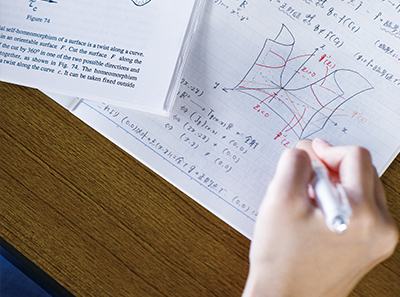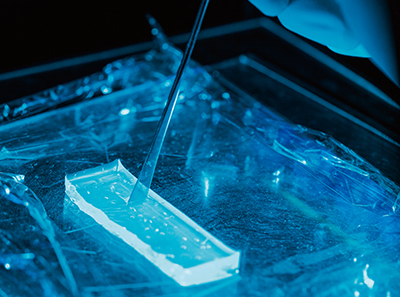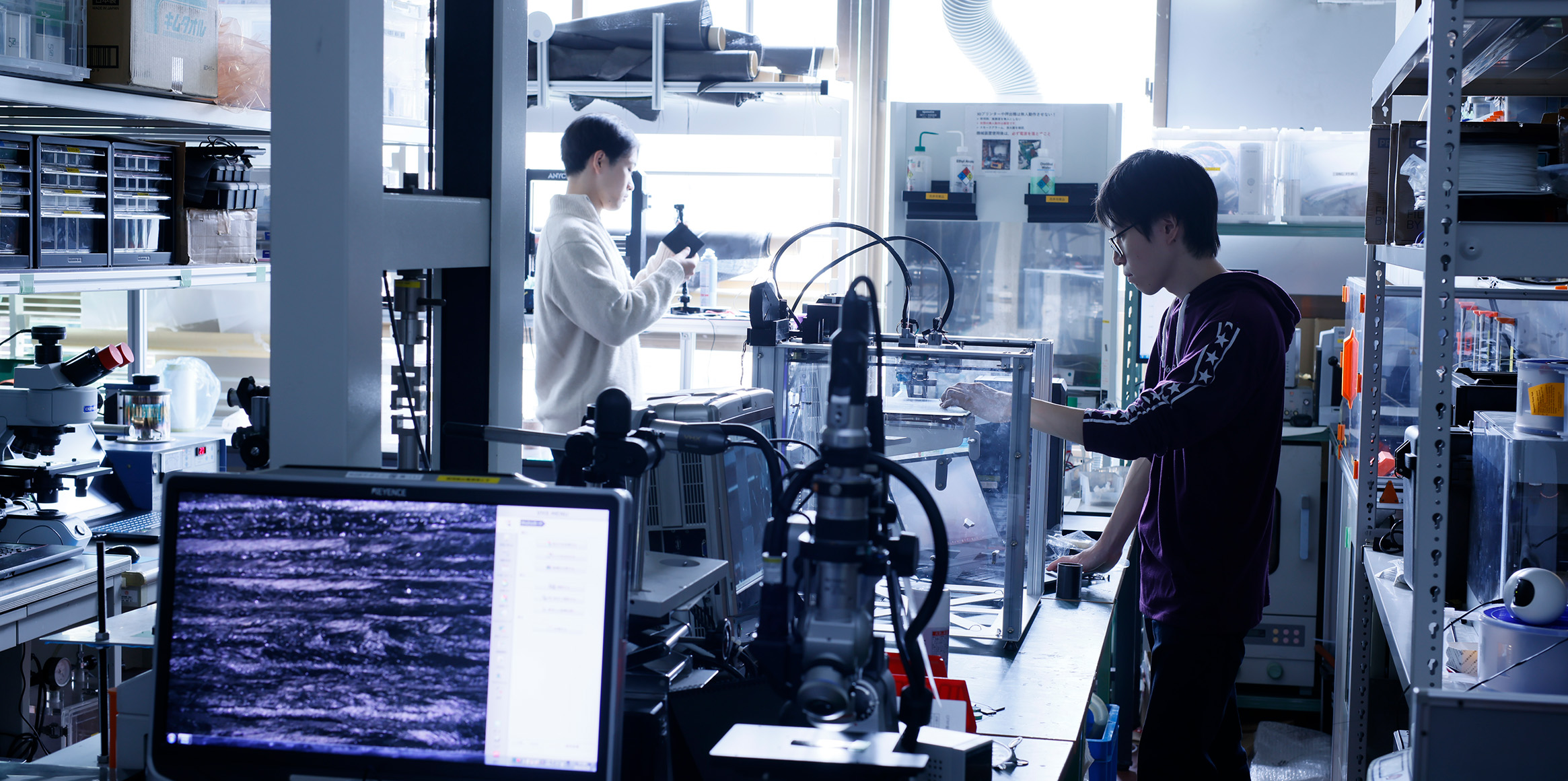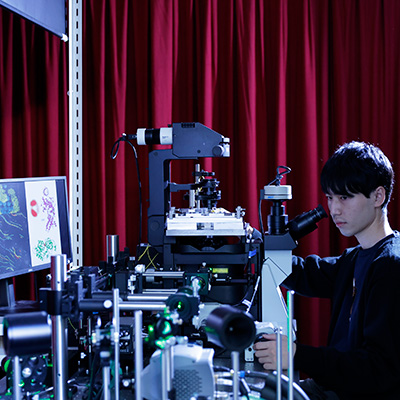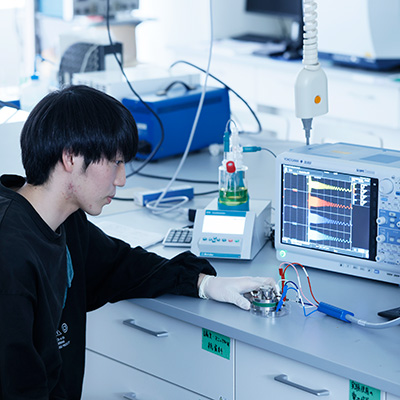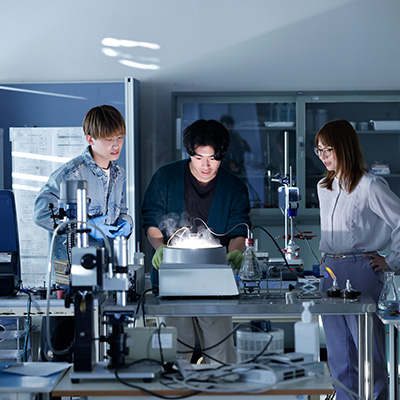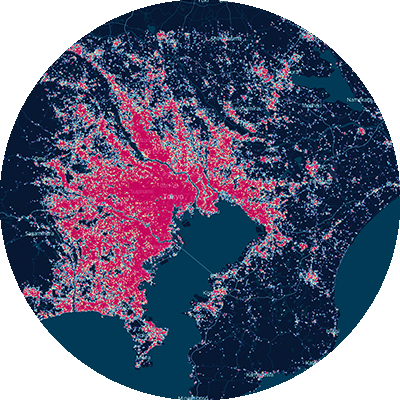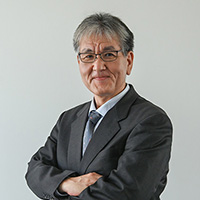In 2017, on the occasion of the 50th anniversary of the establishment in 1967 of the forerunner to the current Faculty of Science and Technology, a six-year integrated course of study and graduate school cross-disciplinary courses were introduced to serve as concrete means of transcending the barriers between departments and laboratories within the faculty at the Noda Campus, fostering an atmosphere of unity in education and research in accordance with the motto of “A Faculty of Science and Technology which seeks resonance between nature, the environment, space and humanity.”
The six-year, integrated course of study integrates the education and research of the four-year undergraduate program with that of the two-year master’s degree program, creating a single course of study which ensures students acquire specialized basic knowledge while having ample time to focus on their research as well as other endeavors, such as cross-disciplinary education and overseas study, in order to facilitate the development of strengths and abilities truly suited to the times.
Furthermore, with the aim of pursuing research that transcends the boundaries of undergraduate and graduate departments and laboratories, the graduate school cross-disciplinary courses allow students to acquire in-depth academic knowledge in their specialized fields, while also being able to deal with diverse issues that cannot be addressed within a single academic field or major, and to develop a broad perspective in order to become the kind of co-creators that society demands.
Also, in 2023, the current Faculty of Science and Technology was established to not only deepen the study and exploration of individual specialized fields but, also, to foster co-creation and fusion with other fields that will lead to the creation of new value in science and technology as well as the creation of altogether new fields of study. As a result, the Noda Campus has become a beacon of “domain innovation culture” to the wider world.
Domain innovation culture involves acquiring a standardized specialized basic education in mathematics, physics, chemistry and experimental data handling, which are all a part of the established, common language of science and technology, at the same time that one is starting research in his or her field of specialization. Furthermore, in addition to the fundamental knowledge and skills of science and technology, we, at the Noda Campus, encourage a spirit of noblesse oblige that uses liberal arts education to cultivate an understanding of society and culture and an appreciation of ethical values and, in this spirit, support learning from faculty and alumni in various fields, promote integrative student-led discussions and encourage other approaches conducive to realizing the sorts of essential technologies and systems adapted for the increasingly diverse society of the future.
A process of “inquiry,” focused on thinking outside-the-box to pursue co-creation, adopting a cross-disciplinary, bird’s-eye view and working harmoniously with a diverse range of people, is being combined with “DX (digital transformation),” which will be essential in the future, to promote organic “inquiry x DX” efforts that will move us towards a new and significantly deeper stage of domain innovation culture. Furthermore, in order to more fully realize the characteristics of DX, the Faculty of Information Science and Technology is scheduled to be established in April 2026 as an entity that will pursue efforts that will broaden and deepen the scope of “inquiry x DX” activities.
In order to translate these ideas into reality for society, in April 2023, we established the Sustainable Urban City Center (CSUC) to promote social collaboration with industry, academia and government, which can be seen as the social implementation of the graduate school cross-disciplinary courses, to capitalize on the location of the Noda Campus to foster close collaboration with the local community, and to undertake a wide range of integrated education and collaborative research. We promote activities that create connections not only with the surrounding area but also with local communities, industries, and the international community, coordinating and facilitating activities that allow all collaborators to put their strengths to good use. Also, by using CSUS to bring together such a diverse range of talent, we want students to have opportunities to take part in activities that will equip them with real and flexible strengths prior to their entry into society.
The Noda Research Campus, where the Faculty of Science and Technology and Graduate School of Science and Technology are located, is (including the Rissokai Memorial Park) 9.2 times the size of Tokyo Dome, and it is located halfway between the city center and Tsukuba Science City. The advantages this environment and location afford enable the campus to conduct collaborative research with many national and private research institutes. In terms of education, depending on the department, students will, for example, conduct research at these external institutions, thus contributing to education and research which is unfettered by the university framework. Additionally, with the support of the local community, the Noda Campus offers students unique research and educational activities, including training for entrepreneurship. Furthermore, we have signed comprehensive partnership agreements with Noda City and Nagareyama City, through which we engage in activities that are closely tied to the local community that contribute to mutual development, not only in education but in various other fields as well.
Given their history, the Faculty of Science and Technology and Graduate School of Science and Technology are determined to step up into a new stage of science and technology, together with the Faculty of Information Science and Technology scheduled to be established in 2026, as they continue to grow and develop, powered by the innovative ideas and thinking that the times demand. Your understanding and support for the education and research activities and various other initiatives of the Faculty of Science and Technology and Graduate School of Science and Technology at Noda is greatly appreciated.
